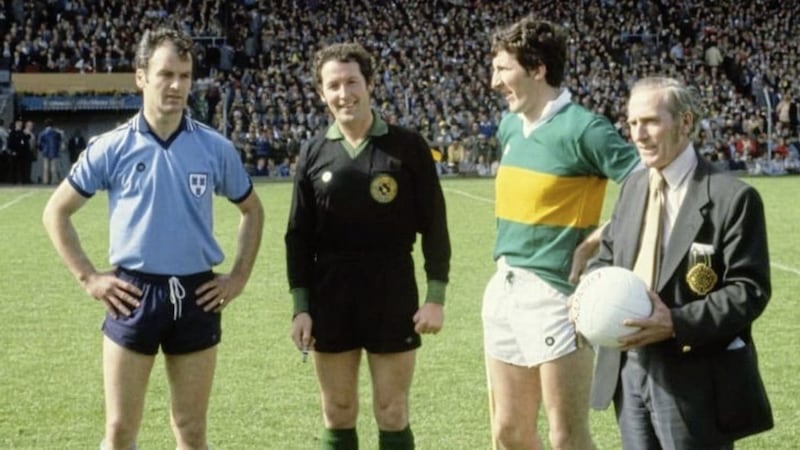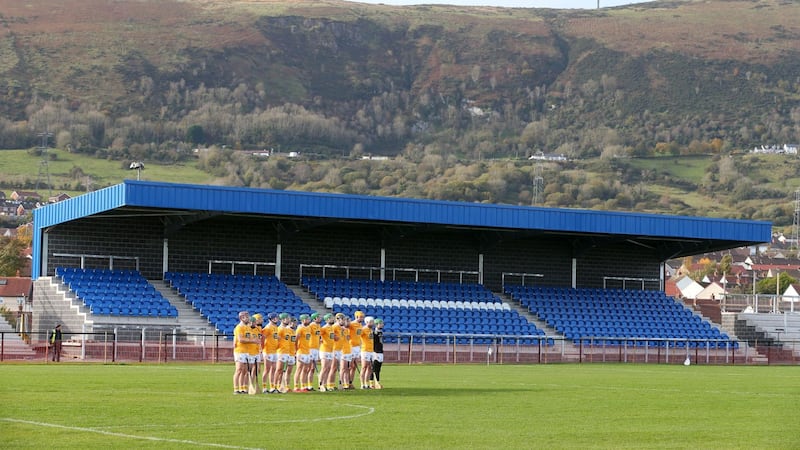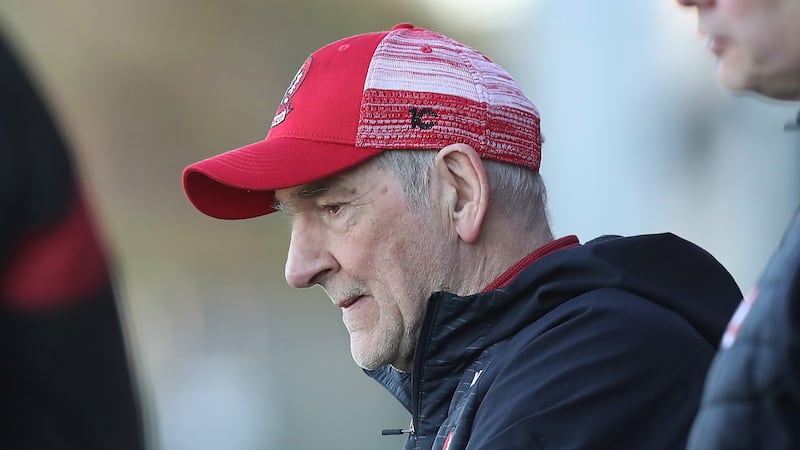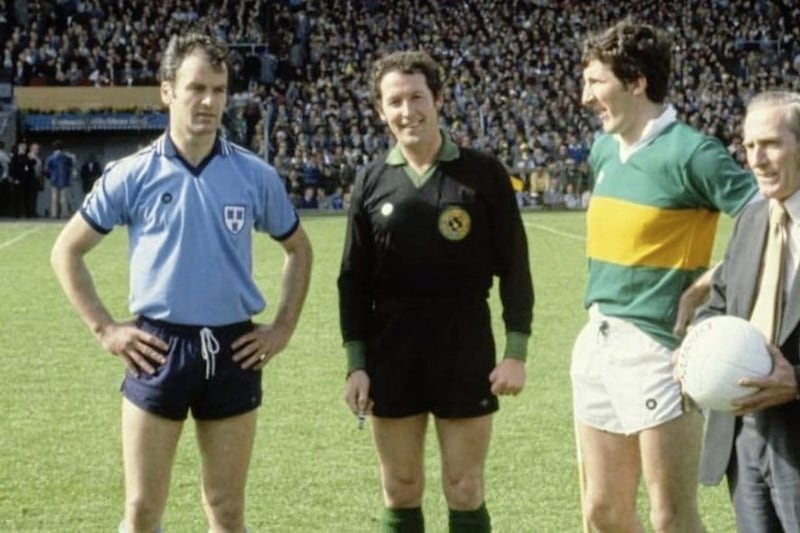ONE last look at his watch and Hugh Duggan stretches his arms out wide and blows the long whistle. The college match is over and so, too, is Duggan’s 50-year career as a referee.
It’s so long ago now that he can’t remember where he started. A wet field in Forkhill or Ballyhegan maybe, the Armagh B Division certainly, way, way back in 1970.
Half-a-century later, he bows out with the Nevada sun beating down on his back and the other-worldly Las Vegas strip in the distance.
What a journey it has been for the Cathedral City native who first took up the whistle aged 29 and has spent the last 39 years of his life in the USA because of “personal and political reasons”.
The GAA which has been the cornerstone of his life and here’s how it started:
“I was still playing with Pearse Og,” he explains over the phone from the airport at Las Vegas where he’s waiting for his flight to San Francisco.
“I was playing in a Ogs-Harps derby in Armagh and this older fella was marking me - he was pulling my jersey every time the ball came near us. I was just faster and younger than he was and I was cleaning him every time and he was pulling the jersey off me and thumping me in the ribs – the usual shit - and I never got a free.
“I said to the referee: ‘Come on ref, you need to do something about this, he’s doing it right in front of you’. He says to me: ‘He has earned the right to do that – he has been playing long enough’.
“I said to myself: ‘I need to take up refereeing so that people like this aren’t out there’. Anyway, the next time he pulled my jersey I took it off, hit him up the face with it and walked off the field.
“I wasn’t disgusted with getting fouled, I was disgusted that I wasn’t getting a free. When I got off the field I made my mind up that I was going to become a referee. I met a friend of mine, Harry McGeough, a couple of days later in Armagh and he said: ‘The Ogs are looking a referee, would you referee for them?’
“I said: ‘Put me down’.”
From that first game in the B Division he progressed steadily up the ranks. He gave up playing to concentrate on the refereeing and by 1974 he was appointed for his first inter-county minor game.
His own experience as a player formed his outlook as a referee. Football would come first and skilful players wouldn’t be blotted out by the strong arm tactics of their markers.
He made it his goal to allow talent to blossom.
“The good players used to love to see me coming because my number one priority was to protect them,” he says in a distinctive Armagh accent undiluted by almost four decades across the Atlantic.
“It was usually younger players who were more skilful and they would be intimidated by older defenders.
“I got a good reputation for protecting skilful players and at that time there was nobody playing ‘advantage’ but I played it very well and that’s what actually helped me to get on, I was such a difference.”
His display in that minor inter-county game convinced the powers that be that he was ready for the step up to senior level and, later in 1974, he threw the ball in for his first National Football League game.
By that stage he had found his balance on the tightrope that every referee must walk and it’s the same now as it was then: Every decision, no matter how blatant, is greeted with praise by one side and flabbergasted rage by the other.
“Every time you blow that whistle, you’re punishing one side or the other and it doesn’t matter how right you are, a lot of people will get pissed-off with your decision,” he says.
“Referees are on a hiding to nothing. They could get 45 calls right and then make one minor mistake and that’s all they talk about.”
You need a thick skin to survive in a world where it’s okay for normally respectful citizens to become lunatics depending on which way the referee points.
Duggan has it and insults and praise bounced off him like water off a duck’s back.
But bullets wouldn’t…
“I used to referee the Madden tournament every year,” he recalls.
“One year there were boys on the run and there was a team from Monaghan in the tournament and one of the boys on the run was supposed to be down playing for them but he got tipped off not to come.”
But no-one had tipped off the security forces…
“I only had the game started and, next thing, these helicopters landed all over the place and there was Saracens everywhere. This Brit got out of one of them and he came over to me on the field and says: ‘Stop this game!’
“I says: ‘I’ll stop it at half-time’ and he put the gun under my chin and says: ‘Stop this f**king game right now’.”
The deep breath before the plunge… Players are frozen still and look on in silence. Will he shoot? Then some wag on the grassy banks breaks the tension: “For f**k sake, pull the trigger!” he shouted, bringing the house down and defusing a powder keg situation.
“That was the funniest thing I ever heard but it wasn’t funny at the time – I was shitting myself,” Duggan admits.
“Thank God he (the soldier) didn’t do it.”
By May 1979, with that and many other incidents behind him, Duggan was one of the foremost experienced and respected officials in the game and so he was chosen to referee the final of the National League (which coincidently was played on a North-South basis like this year’s) between Cork and Roscommon.
Monitors watched his every move and gauged every blow of the whistle. Could the northerner handle the atmosphere? Would he bow down to pressure from players and supporters?
Duggan ticked every box and so his biggest break yet came when he was appointed to take charge of that year’s Ulster Championship between Monaghan and Donegal.
Just another game? Not quite.
Ninety-one years since its inception, the 1979 decider was the first one to be televised live by the BBC. That meant that, for the first time ever, TV scheduling was a factor and, with the GAA in the spotlight, Duggan was warned, and then warned again, that, come hell or high water, the match had to start on time.
The crowd, the weather, the teams, the band… Everything was factored in, or so they thought. But no-one had planned for the reception Archbishop of Armagh Tomas O Fiaich received when he arrived at the ground after having been created Cardinal by Pope John Paul II.
Beloved by his people, Cardinal O Fiaich received a heroes’ welcome and was invited onto the Clones pitch where faithful in blue and white and green and gold clamoured to shake his hand and wish him well.
The match was almost forgotten as the minutes ticked away towards the scheduled start of the action and, with five minutes left until throw-in, the Cardinal was still surrounded by well-wishers.
Duggan had a job to do.
“The Cardinal was a big GAA man and he knew me well – he used to ride his bike around the roads outside Armagh and I’d meet him when I was out for a run and he’d stop for a chat – but I went over to him and said: ‘Your Eminence, I need you to leave the field’,” he explains.
‘Ah, take your time,’ he said.
“So I had to push him off the field!”
By the time the Cardinal finally left the field it was time to start the game and there no time for the band to play the national anthem. Duggan told the two captains that there would be no pre-game parade around the field behind the band and no anthem.
The players took their positions, Duggan threw the ball in and Donegal went down the field and scored a point… But the drama did not end there.
“Next thing there was an announcement,” Duggan recalls.
“Somebody was on the tannoy: ‘This game will have to be restarted for the National Anthem to be played…’”
He offered to stop the game to allow the Soldiers’ Song to be played but was told it would have to be started from scratch. And so the band came on, the anthem was played, he threw the ball in for a second time and a new game began which Monaghan won 1-15 to 0-11.
“I was in some sweat because, if it had been a draw at the end, I would have been in trouble because Donegal would have rared up about the point they didn’t get,” he said.
“There were two Ulster finals that day: one for a minute and-a-half and another for the normal time!”
Amid the mayhem of the Cardinal arriving, the pressure of the TV cameras and the restarts, Duggan could have been forgiven for throwing his whistle to the nearest bystander, running up the Clones hill, jumping over the fence and driving home as fast as he could.
But he stood firm and his calm and composed exterior rightly convinced the GAA that the Armagh native should be awarded the ultimate accolade for a referee and he was selected to take charge of that year’s Sam Maguire decider between Kerry and Dublin.
When he heard the news, Cardinal O Fiaich invited him to his home to wish him well.
“When I was leaving I says to him: ‘Your Eminence, can you give me any advice?’” he recalls
“He says: ‘I’ll give you one bit of advice Hugh, for Christ sake let the Artane Boys’ Band play the Soldiers’ Song!’”
The 1979 All-Ireland final was one of those technicolour classics that pitted the emerging might of Mick O’Dwyer’s Kerry against Kevin Heffernan’s Dublin. The Dubs had kept Sam in the capital in 1977 but Kerry had beaten them heavily the following year and defended their title (on the way to four in-a-row) in 1979 despite losing the late, great Paidi O Se to a red card.
“I had booked him early on,” recalls Duggan.
“He hit a boy late and I actually had to call the doctor on to revive the boy. Then, towards the end of the game (Kerry were five or six points up) one of the Dublin boys was going through and Paidi jumped on his back so it was another booking. He was shocked, he couldn’t believe he was getting sent off for so little – he said he didn’t hurt anybody.
“Afterwards I got the players from both sides to sign a programme but he wouldn’t sign it – he told me to f**k off and he never spoke to me for two or three years.
“But fair play to him, the All-Ireland champions used to come to San Francisco and play the Allstars at that time and he got up on the stage at the banquet after the match in San Francisco and apologised to me in front of everybody for ignoring me.
“Me and him became good friends and he invited me and my wife down to stay in Kerry. We had a great night’s craic sitting talking about old times, he was a decent fella.”
That 1979 final proved to be his last because, little more than a year later, Duggan boarded a plane to the USA. His reasons were “personal and political” and he doesn’t go into them but initially he expected his stay might last 12 months.
It didn’t pan out like that of course and he spent 37 years living in Oakland, California before moving to Tampa, Florida three years ago.
“America has been good to me and I’m happy,” he says.
“We love Florida and I get back (to Armagh) often enough. Last year was the only time I couldn’t get back (because of Covid) but as soon as it opens up again I’ll be back.”
From his first minute in exile he missed the craic and the familiar faces of his native county but it wasn’t long before he became immersed in the GAA in his new home. He formed the Ulster Club in San Francisco and has been chairman of the GAA board in San Francisco on three different occasions. Alongside that he was manager of the Michael Cusack’s club and guided them to three National Championships.
But of course refereeing was the finest string on his bow and, wisely, GAA officials in the US made the most out of having an All-Ireland final standard official on their soil. As the national referees’ development and administrative officer, Duggan has covered a great deal of it.
“I was kept busy and I’ve travelled this whole country giving lectures and holding classes,” says the sprightly 79-year-old.
“In 2019 I travelled 30,000 miles round the country in 11 days giving refereeing classes. I started off in Tampa, went from there to Atlanta, then Austin, (Texas), then San Diego, then LA, then San Francisco, from there to Seattle and from there to Denver and back down to Charlotte (North Carolina) and then back to Tampa.”
In every city, a championship game was scheduled for him to referee and rookie whistlers watched how he made every effort to allow the game to flow, how he spoke to players and how he made decisions with the confident authority of a man who knew the rulebook inside and out.
But a few weeks ago he decided enough was enough.
“Starting off in Armagh and finishing in Las Vegas… I thought it was the perfect way to go out,” he says.
“The GAA has been good to me but I have been refereeing since 1970 so it has been a long time and I figured this was a good time to go.”
His efforts have not gone unnoticed and he was inducted into the National Referees’ Hall of Fame and was presented with the Presidential Medal for his services overseas. He earned those awards over 50 years as the man in the middle who let the players play and sent British soldiers, Cardinals and even Kerry legends off the field.
Precious memories he’ll hold dear until the long whistle blows…




